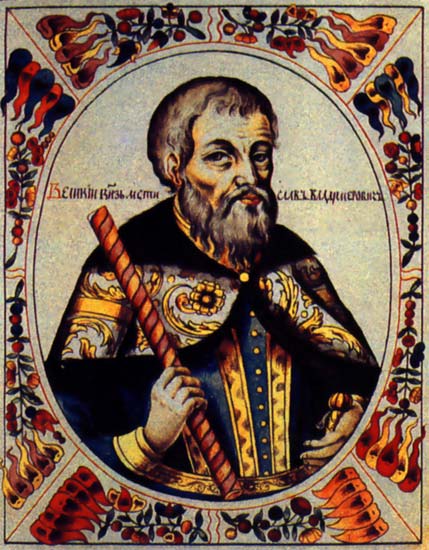<Back to Index>
- Astronomer Geminiano Montanari, 1633
- Poet Antonio Joaquim de Castro Feijó, 1859
- Grand Prince of Kiev Mstislav I Vladimirovich the Great, 1076
PAGE SPONSOR

Mstislav I Vladimirovich the Great (Russian: Мстислав Владимирович Великий) (June 1, 1076, Turov – April 14, 1132, Kiev) was the Velikiy Kniaz (Grand Prince) of Kiev (1125 – 1132), the eldest son of Vladimir II Monomakh by Gytha of Wessex. He figures prominently in the Norse Sagas under the name Harald, taken to allude to his grandfather, Harold II of England.
As his father's future successor, Mstislav reigned in Novgorod the Great from 1088 - 93 and (after a brief stint at Rostov) from 1095 – 1117. Thereafter he was Monomakh's co-ruler in Belgorod Kievsky, and inherited the Kievan throne after his death. He built numerous churches in Novgorod, of which St. Nicholas Cathedral (1113) and the cathedral of St Anthony Cloister (1117) survive to the present day. Later, he would also erect important churches in Kiev, notably his family sepulchre at Berestovo and the church of Our Lady at Podil.
Mstislav's life was spent in constant warfare with Cumans (1093, 1107, 1111, 1129), Estonians (1111, 1113, 1116, 1130), Lithuanians (1131), and the princedom of Polotsk (1127, 1129). In 1096, he defeated his uncle Oleg of Chernigov on the Koloksha River, thereby laying foundation for the centuries of enmity between his and Oleg's descendants. Mstislav was the last ruler of united Rus, and upon his death, as the chronicler put it, "the land of Rus was torn apart".
In 1095, Mstislav wed Princess Christina Ingesdotter of Sweden, daughter of King Inge I of Sweden. They had many children. Christine died on January 18, 1122; later that year Mstislav married again, to Liubava Dmitrievna, the daughter of Dmitry Zavidich, a nobleman of Novgorod. They had two children, a son and a daughter. Through his daughter Euphrosyne, Mstislav is an ancestor of King Edward III of England and hence of all subsequent English and British monarchs. Through his mother Gytha, he is part of a link between Harold II of England and the modern line of English kings founded by William the Conqueror, who deposed him.